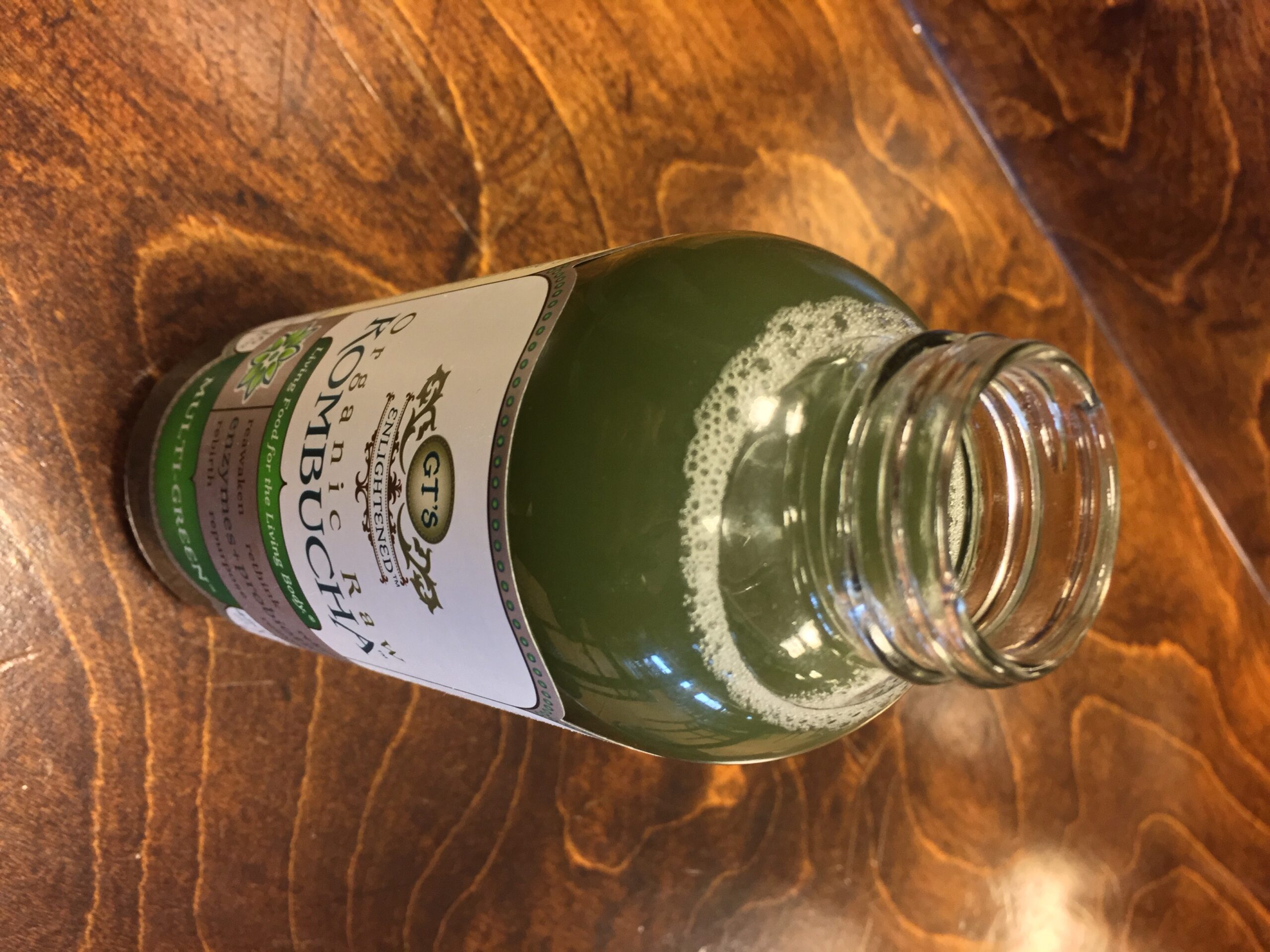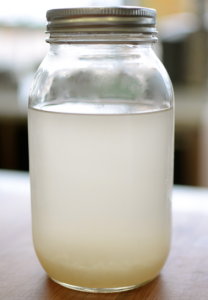I’m guessing this title sparked some interest for you avid kombucha drinkers. Whether you’ve been curious to try kombucha or a hipster who drinks it like it’s going out of style, this article will shed some light on this stylish fizzy beverage.
The simple truth is kombucha isn’t all that healthy for you…
What Is Kombucha?
Kombucha is a sweet fermented tea that is made with “tea fungus,” or a floating network of bacteria and yeast. It is made by fermenting black or green tea — sometime a mixture — with the fungus; otherwise known as a SCOBY (symbiotic culture of organisms, bacteria and yeast), sounds delightful doesn’t it?
Kombucha traditionally hails from northeast China, about 1,600 years ago. It was used to cure the digestive problems of the Emperor Inkyo. Overtime, the bubbly beverage made its way to Russia and eventually Germany, France, North Africa, and then Italy.
Today, kombucha is available around the world with ease. You can buy it at most health food stores and it’s even making its way into popular chain grocers. If you’re a true kombucha fanatic, you can make it at home with a SCOBY, black tea, and sugar.
Why Not Kombucha?
Kombucha isn’t all bad, like anything else, the poison is usually in the dose. Considering it has survived thousands of years, it obviously has something to offer. But much like beer, wine and other fermented beverages, there comes a risk with its’ reward. This article is today is not about “bashing” kombucha but rather to bring awareness on some of the overlooked shadowy spots of this popular drink.
Are there health benefits to kombucha? Of course. Both traditional medicine and scientific studies tell us that kombucha has a lot to offer:
- B vitamins for healthy energy
- Beneficial bacteria (probiotics) for gut health
- Living enzymes
- Antioxidants
These few benefits alone would send most people to the nearest Whole Foods for their share of this fizzy fungus tea. However, let us consider the unconsidered. Many people who are consuming kombucha for these benefits are telling half of the truth. As we all know these constituents can be found in plenty of the foods without the wild fungus, sugar and alcohol.
4 Reason To Ditch The Kombucha
Before I proceed any further, I want to make clear that this information is more so directed to people who feel and look worse when drinking kombucha, or those in denial about it. If you are one of these people consider these four causes:
- Kombucha contains wild yeast- This drink is what is called a “wild ferment” meaning it cultures from an array of different bacteria and yeast, often times contaminated with compromising organisms like Candida. The SCOBY in your homebrewed kombucha changes according to its environment. It can become contaminated with housing molds and fungi that cause illness. One study from 1995, found that two samples of homebrewed kombucha (from a pool of 32) were contaminated with Candida albicans—the same opportunistic yeast that more than 80% of people have an imbalance of causing everything from acne to autoimmune disease. This is an issue of balance. A truly healthy individual has more good bacteria to bad, making kombucha not as harmful. However, majority of people have gut problems and would be much better off getting their enzymes, probiotics and b-vitamins from something like cultured vegetables, coconut kefir made with a strain specific starter culture.
- Kombucha contains alcohol- When the yeasts in kombucha feed on sugar, they produce alcohol and gas. Candida and other opportunistic yeasts produce a byproduct called acetaldehyde, as it feeds on sugar. Acetaldehyde is an irritant, carcinogen, and air pollutant that is found in cigarette smoke and car exhaust. Consumed in high enough quantities in the body, it can lead to a rapid pulse, sweating, skin flushing, nausea, and vomiting. If you’ve ever had a hangover, you have felt the effects of too much acetaldehyde. When brewing kombucha, the alcohol content increases with time (around the sixth day) and then slowly decreases. Kombucha can contain as much as 5.5 g/L of alcohol—or 2.8% alcohol. Most store bought kombuchas have lower-alcohol content; however, thoughh these allowed to brew for a longer period of time contains less alcohol they possibly contain more acetaldehyde.
- Kombucha may contain heavy metals and fluoride- The tea fungus (or SCOBY) floating around in your kombucha is biosorbent. Like a magnet to iron, it binds to contaminants and heavy metals. Biosorbents are used to clean up the environment and wastewater. Indeed, several studies have found that a kombucha tea fungus effectively removes heavy metals like copper, chromium, and arsenic from wastewater. Other research shows that kombucha itself contains small amounts of lead and chromium. There have even been a few documented cases of lead poisoning from kombucha. Kombucha tea fungus will absorb and sometimes even magnify pollutants. When making kombucha at home or buying from a manufacturer, both air quality and water quality matter. So does your storage vessel—pass on stoneware that may be coated with a lead or cadmium glaze and opt for glass. Be sure to sterilize!
- Kombucha contains sugar. Common table sugar—which also goes by the name of cane sugar, beet sugar, or sucrose—powers the fermentation of kombucha. Yet a considerable amount of sugar is left unfermented in kombucha. In 2001, researchers at Bucharest University found that a little over 34% of sugar remains after seven days of fermentation. After 21 days, this percentage drops to 19%. This is why kombucha still tastes sweet—even though it’s fermented. If you don’t know, sugar is one of the most powerful physical immune system suppressants. Even a trace amount of unnatural sugar can shut your immune system off. Too much of even natural sugar can cause accelerated aging via glycation, and attribute to fatty liver disease. It’s best to stick to sugar-free probiotic sources.
The Only True Reason To Drink Kombucha
For the reasons listed above, kombucha isn’t an ideal health food. It falls into the category of a wild ferment and is too much of a threat to a recovering immune system. However, many people report feeling better when they drink kombucha.
The only reason to drink kombucha is because it makes you feel healthier. After all, no diet or study contains more wisdom than your spirit. The placebo effect is perhaps the greatest healer of all. If kombucha is working for you; great, you likely have a strong immune system and even stronger control over your mind, body connection.
If you are not feeling great after kombucha for any reasons it is likely due to the sugar, the small amount of alcohol, and wild strains of yeast, which are all immune suppressors.
This Is Better Than Kombucha
Again, if kombucha works for you, by all means enjoy it and like anything else, in moderation. If you are like me, and seek the best, then look no further. There is a drink concoction hat contains similar benefits to kombucha with a higher reward:risk ratio. It is called Coconut Kefir.
This drink is far superior to kombucha as it contains no sugar, alcohol or wild yeasts. It contains far more beneficial bacteria and it’s mineral balance makes it incredibly hydrating; making it a true beauty food. Kombucha may contain more antioxidants in the form of phenols from the green tea; however, supplementing with green tea extract or sipping a cup of green tea like gynostemma would be a far better choice if your concern is of antioxidants.
If you want to learn more on coconut kefir, how to make it and where to purchase it check out my blog post here.
There you have it kombucha fans, sorry if I let you down in anyway. Hopefully this shined some light on the dark sides of this hip drink to better inform your drinking choices! Thank you for reading and until next time!
Love,
Nick

